![]()
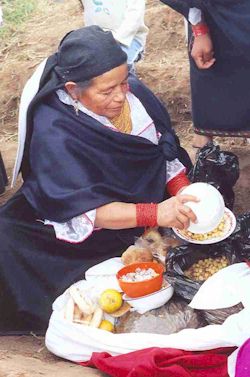
Here we see a woman who has brought food to a cemetery near Otavalo, to share with the living and the dead. Otavalo, a market town in the province of Imbabura, northern Ecuador, is the center of a vibrant indigenous community of Quichua-speaking Runa, that is, Indians speaking a dialect of Quechua, the language of the Incas.
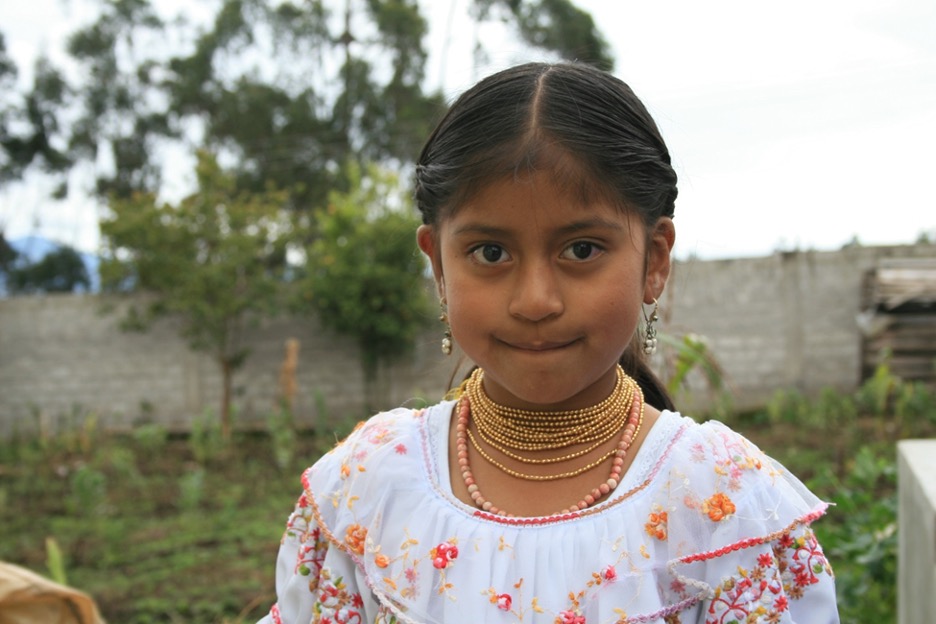
I enjoy good friendships with extended families in Ilumán and Peguche, two of several indigenous towns near Otavalo — moreover, my wife, Patricia Glushko, and I, became compadres to our Ilumán friends when we helped baptize little Alejandra Lisbet in 2007.
The Otavalo Runa are deservedly famous for their weaving and their music,
and for having the entrepreneurial spirit to move these commodities around
the globe. I am drawn to the traditional music of this region, famous most
of all for the plaintive yet inspiring sanjuanito. I am intrigued with the
roles played by musicians within the community and as cultural ambassadors
to the world beyond, and more generally, with the interplay between
spontaneous and choreographed expressions of Runa identity in a historical
moment of great change -- Otavalo Runas are experiencing a remarkable
improvement of fortune, and their newfound prosperity affords them levels
of economic and political power that would have been scarcely thinkable a
generation or two ago.
I think through how my Quichua friends participate in modernity in this article:
"Rethinking Folklorization in Ecuador: Multivocality in the Expressive
Contact Zone," Western Folklore (2010) 69: 181-210
![]()
OTAVALO
MUSICIAN FRIENDS
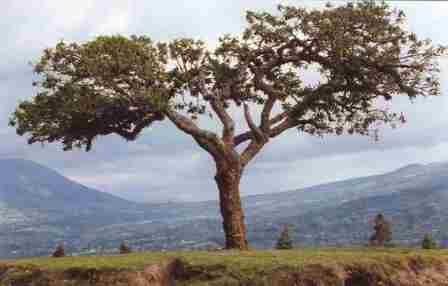 My connection to Otavalo and its people began years ago
during trips through Ecuador. I still recall the gravel road between
Tulcán and Quito, a twelve-hour, grueling and yet spectacular trip in
the buses of the 1970s. Otavalo was a welcome respite along the way, a
place of beautiful Andean music, locally-woven textiles, and friendly
folks. In the early 1990s I became acquainted with Luis Alberto
Yamberla, who has since become my compadre, and he proposed that we
arrange to bring his musical ensemble, at the time known as Inca Ñan
(Inca Trail), to my home town of Bloomington, Indiana. We did manage to
accomplish this Inca Ñan, which later morphed into Inti Raymi
(Festival of the Sun), came to Bloomington several times to play in the
Lotus Festival and to share knowledge of Andean culture, language, and
music with my students and colleagues at Indiana University. Perhaps
their most memorable Lotus Festival appearance was two weeks after 9/11,
when they stepped into the breach when so many international troupes
were unable to travel.
My connection to Otavalo and its people began years ago
during trips through Ecuador. I still recall the gravel road between
Tulcán and Quito, a twelve-hour, grueling and yet spectacular trip in
the buses of the 1970s. Otavalo was a welcome respite along the way, a
place of beautiful Andean music, locally-woven textiles, and friendly
folks. In the early 1990s I became acquainted with Luis Alberto
Yamberla, who has since become my compadre, and he proposed that we
arrange to bring his musical ensemble, at the time known as Inca Ñan
(Inca Trail), to my home town of Bloomington, Indiana. We did manage to
accomplish this Inca Ñan, which later morphed into Inti Raymi
(Festival of the Sun), came to Bloomington several times to play in the
Lotus Festival and to share knowledge of Andean culture, language, and
music with my students and colleagues at Indiana University. Perhaps
their most memorable Lotus Festival appearance was two weeks after 9/11,
when they stepped into the breach when so many international troupes
were unable to travel.
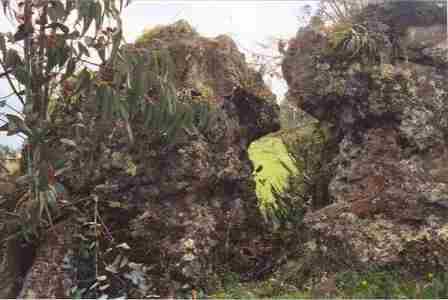 At the core of this talented group are two extended families,
one based in Ilumán and the other in Peguche -- the former known for its
yachaks, the native healers, and the latter for its weavers. Luis
Alberto, his brother Manuel, and his brothers-in-law Enrique and
Antonio, are the founding members of Centro Cultural Inti Raymi, who
sponsored my research visit to Otavalo in 2005. Humberto and Alonso Díaz
are two brothers from Peguche who have hosted me and my family and
proved to be excellent consultants on Otavalo Runa customs. These
friends and relatives have had great success playing the sanjuanitos
of their region and other Andean music together over the years.
At the core of this talented group are two extended families,
one based in Ilumán and the other in Peguche -- the former known for its
yachaks, the native healers, and the latter for its weavers. Luis
Alberto, his brother Manuel, and his brothers-in-law Enrique and
Antonio, are the founding members of Centro Cultural Inti Raymi, who
sponsored my research visit to Otavalo in 2005. Humberto and Alonso Díaz
are two brothers from Peguche who have hosted me and my family and
proved to be excellent consultants on Otavalo Runa customs. These
friends and relatives have had great success playing the sanjuanitos
of their region and other Andean music together over the years.
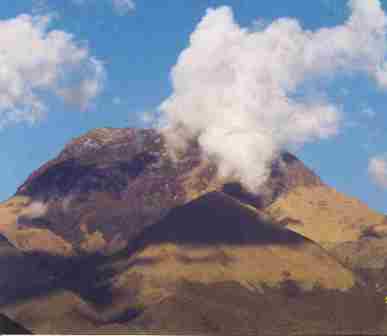 A
trip to Otavalo in 2005 gave me and my family the opportunity to meet
families of the migratory musicians who had become our fast friends over
the years. We had a great time getting our family together with their
families, and found the women of our musician friends, especially Maruja and Carmen from Ilumán, and Marta and Maritza from Peguche, to
be inspirational in their dedication to home and family. The children,
including our Goddaughter, Alejandra, pictured here, like children everywhere, are just
wonderful.
A
trip to Otavalo in 2005 gave me and my family the opportunity to meet
families of the migratory musicians who had become our fast friends over
the years. We had a great time getting our family together with their
families, and found the women of our musician friends, especially Maruja and Carmen from Ilumán, and Marta and Maritza from Peguche, to
be inspirational in their dedication to home and family. The children,
including our Goddaughter, Alejandra, pictured here, like children everywhere, are just
wonderful.

![]()
ILUMAN
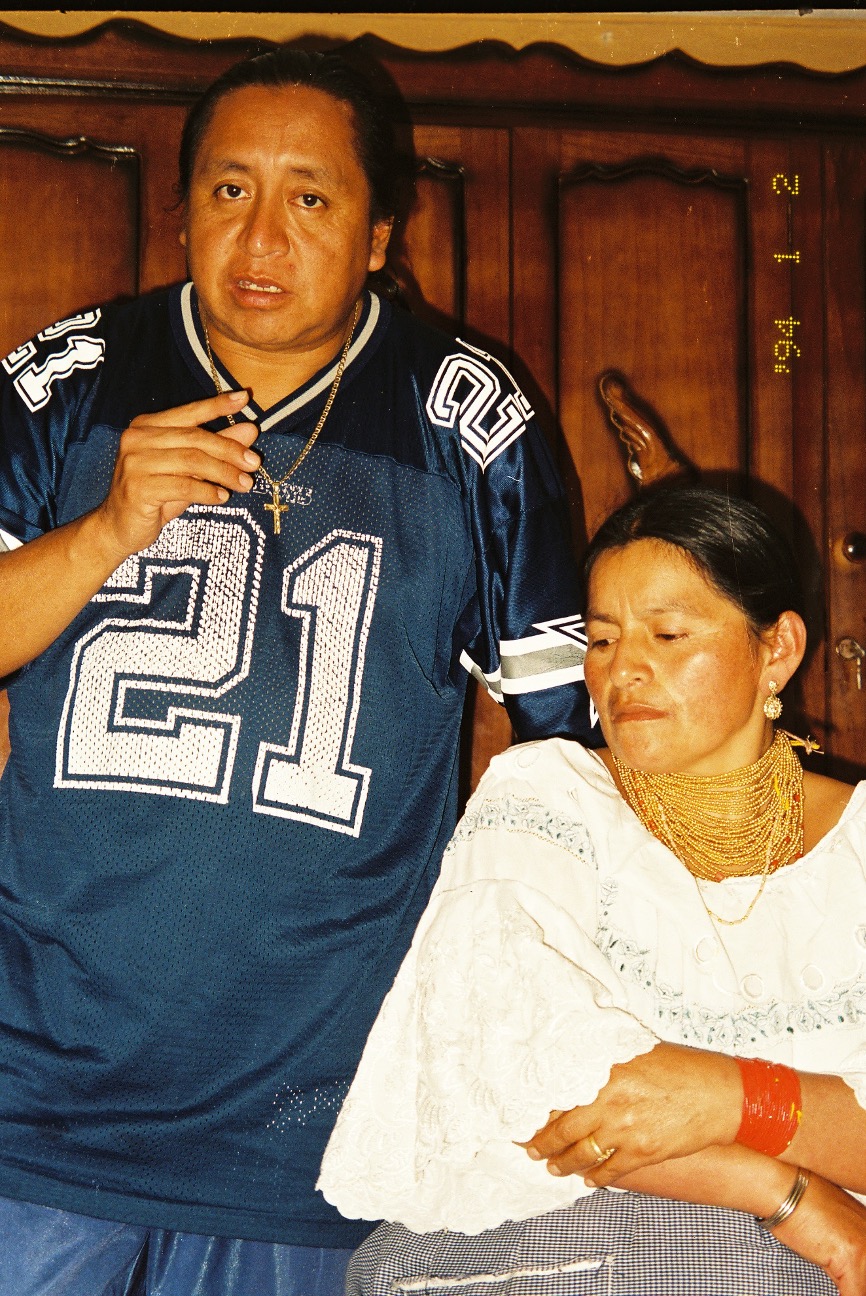
Alberto and Maruja in Ilumán
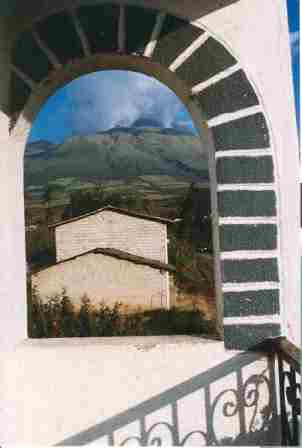
With the able assistance of Alberto, I found a willing sponsor for my work in the Otavalo area, the CCIR, Inti Raymi Culture Center. At a late-night meeting, the members of CCIR drew up a contract to assist me in gaining a better understanding of Runa traditions, as they put it: "Queremos dar a entender nuestra realidad de vida" (We want to explain the reality of our life.) In the following months, they followed through with this plan, enabling me, my wife Pat, and our son Michael to work as an ethnographic team and document many aspects of life in Ilumán. The photos and documents you see reproduced here will give you an inkling of what we have been doing with our Ilumán friends.
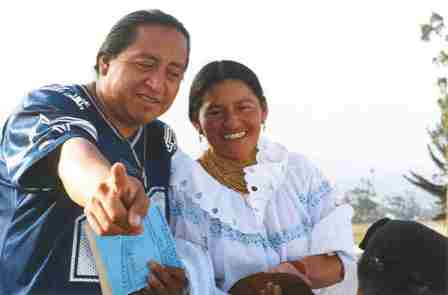
Alberto and Maruja
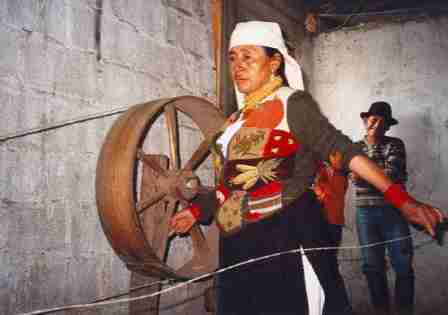
Antonio's mother is spinning woolen thread
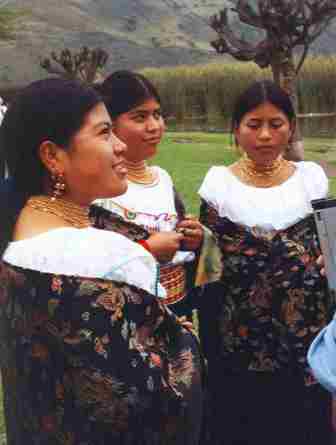
Members of the Pinsaqui dancers
![]()
"Muyumushami" ("I Will Surely Wander")
Kanda maskashpa purini
I go about looking for you
Juyaiguwan kausangapa
In order to live with love
Maipi kashpapash yarini
Wherever I may be I think of you
Kamba ñahuita muscuni
I dream of your face
I will surely come back, little woman
Llaki llakimi kausani
Sad, so sad I live
Tukui tutami wakani
All the nights I cry
Kamba juyaita yarishpa
Remembering your love
Ima punllaka warmigu
One day, little woman
Kikinwanllata purishun
Just with you we will go together
Nuka shungupi kausangui
You live in my heart
Llakirishpa kausashun
We will live loving one another
Tigramushami yanagu
I will return, little dark one
Llakirishpami kausashun
We will live loving one another
Tukui tutami wakani
All night long I cry
Kamba ñavita yarishpa wakani
Remembering your face, I cry
(A song created by the Inti Raymi band)
![]()
PEGUCHE
Humberto and Alonso Díaz are musicians. Humberto specializes in the string instruments (he is also an excellent chauffer), and Alonso is adept with both winds and strings. They have worked closely with the founders of the distinguished musical ensemble, Ñanda Mañachi, one of the first Otavalo Runa groups to record and still very active as curator of the tradition. Humberto has been helpful in explaining the role of musicians in the Inti Raymi celebrations, and Alonso has helped me transcribe the Quichua words to many Runa songs. In the photos and documents I have added here, you will get an idea of what we have been doing with our Peguche friends.
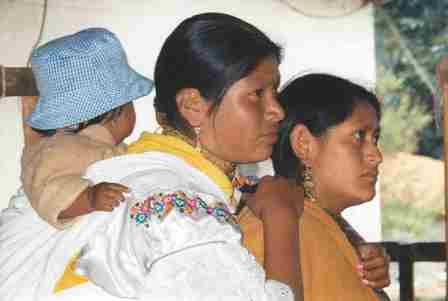
Maritza and Marta with a little one
![]()
Ñaupa Taitacuna Mamacuna, Ñuca Taitacuna
Fathers, Mothers of Our Ancestors, My Parents
by Alonso Díaz
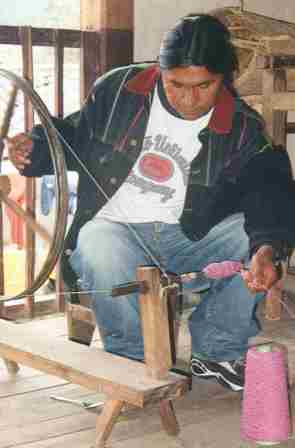
(Alonso is spinning thread)
Ñuca yarini punda imashami taitacuna trabajancarca
I remember how my parents worked
Imashami wagracunawan yapushpa
How they plowed with the pair of cattle
Guachushpa sarata trigota porotota cebadata papata tarpuncana
Making furrows, just so they planted wheat, beans, oats, potatoes
Ñucanchiman micuchingapa ama micuna faltachun
In order to give us our food, so food would not be lacking
Ñuca yarini imashami taitacuna churajushpa purincarian
I remember how the men went about clothed
Gushto sumbrota ruanata pargatita muquiticalsonda churajushpa purincana
Wearing a fine hat, cape, sandals, white cotton pants, they went about
Mamacuna gushto anacota pargatita uma watarinata churajushpa purincana
The women, wearing their fine skirts, sandals, head scarves, they went about
Cunan causaipi rikunchi ñucanchi jipa huaquicuna mishu causaita mishu micunata
mishu shimikaman parlanajun
These days we see how our younger brothers and sisters live like mestizos, eat like mestizos
and are even speaking like them
Runa causita ama chingachishun, runa shimita ama chingachishun, runa kayta Zaupaman apashun
We must not lose our way of life, we must not lose our language, we must bring forward our tradition
Ama saquishun mashicuna, ama cungashun huaquicuna
We must not yield, my friends, we must not forget, brothers and sisters.
![]()
Last Modified Jan 30, 2023